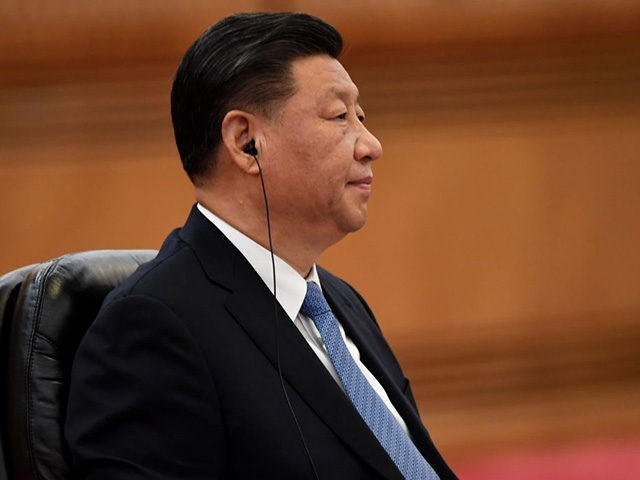Chinese leader Xi Jinping visited an exhibit on China’s involvement in the Korean War at a military museum in Beijing on Monday, falsely claiming a Chinese victory in the conflict.
The Korean War caused three years of fighting on the Korean Peninsula. It began with North Korea invading the South in June 1950 and active fighting ended with an armistice in July 1953. China entered the war in October 1950, sending what it referred to as “volunteer” troops, officially the Chinese People’s Volunteer (CPV) army, to aid the North Koreans. Neither side of the Korean War agreed to a peace treaty, meaning the war is still technically ongoing today.
The museum exhibit visited by Xi and other Communist Party of China (CPC) leaders on Monday commemorates the 70th anniversary of the CPV army entering the conflict. China’s military involvement in the war has been increasingly emphasized in recent years by the CPC, which refers to the conflict as the “War to Resist U.S. Aggression and Aid Korea.”
“The victory in the War to Resist U.S. Aggression and Aid Korea was a victory of justice, a victory of peace and a victory of the people,” Xi said at the exhibit, falsely claiming that Beijing had contributed to a victory in a war won by neither side.
He “called the great spirit forged during the war a ‘precious spiritual wealth’ that will inspire the Chinese people and the Chinese nation to overcome all difficulties and obstacles, and prevail over all enemies,” People’s Daily, the official newspaper of the CPC Central Committee, reported on Tuesday.
Xi is the General Secretary of the CPC Central Committee and Chairman of China’s Central Military Commission.
“Xi demanded in-depth study and publicity of the heroic deeds and revolutionary spirit of the CPV army to encourage the Party, the armed forces and people of all ethnic groups to unite more closely around the CPC Central Committee, keep their faith in ultimate victory, and boost their abilities of struggles,” according to the report.
Over the past few years, CPC leaders have shifted the official narrative of Beijing’s decision to enter the Korean War from one of socialist solidarity with North Korea against imperialist aggressors to a myth of sacrifice by Chinese soldiers, who humbly “volunteered” to protect China from threats to its sovereignty by the U.S.
China’s newly renovated Korean War memorial in the northeastern city of Dandong, located along the North Korean border, serves as an example of this narrative shift. The memorial was shuttered for the past six years but recently reopened in September. In exhibits at the memorial, U.S. troops are portrayed as “invasive forces,” whereas China had previously referred to them in more neutral terms prior to 2014, when the memorial closed for the second time in its 62-year history.
After its first closure in 1966, the Dandong memorial did not reopen “until 1993, a year after China normalized relations with South Korea — a rapprochement that enraged the North and made it urgent for China to assert its version of history. The hall closed again in 2014, ostensibly for repairs, amid Chinese anger at missile tests and nuclear-weapons research by North Korea,” the Economist noted earlier this month.
“The latest memorial has an intensely domestic focus. Its dioramas, enlivened with the bright lights of projected explosions and the boom of recorded gunfire, feature American soldiers in two roles: fleeing and dying. North Koreans are glimpsed mostly as helpless civilians, thanking Chinese troops for rescuing them,” the magazine said of the site’s most recent curation.
North Korean leader Kim Jong-un pledged to boost his country’s relations with China this week, North Korea’s state-run Korean Central News Agency (KCNA) reported.
“Kim said he would make positive efforts with Chinese President Xi Jinping to ‘further consolidate and develop the traditional DPRK-China friendly relations’,” KCNA relayed, using the initialism of the North’s official name, the Democratic People’s Republic of Korea.
“Kim made the remarks on Monday in a reply message to Xi, who sent a congratulatory letter to Kim earlier this month to mark the 75th founding anniversary of the North’s ruling Workers’ Party,” according to the report. In his note to Kim, “Xi expressed China’s intent to ‘successfully defend, consolidate and develop’ the bilateral relations” between Beijing and Pyongyang. China remains one of North Korea’s key trading partners “and a key source of food, arms, and fuel, giving Beijing significant leverage over Pyongyang,” the Korea Herald noted on Tuesday.
North Korea unveiled a new intercontinental ballistic missile during a military parade to mark the 75th founding anniversary of the Workers’ Party on October 10. Pyongyang claims that the missile is capable of striking any part of the continental U.S.

COMMENTS
Please let us know if you're having issues with commenting.